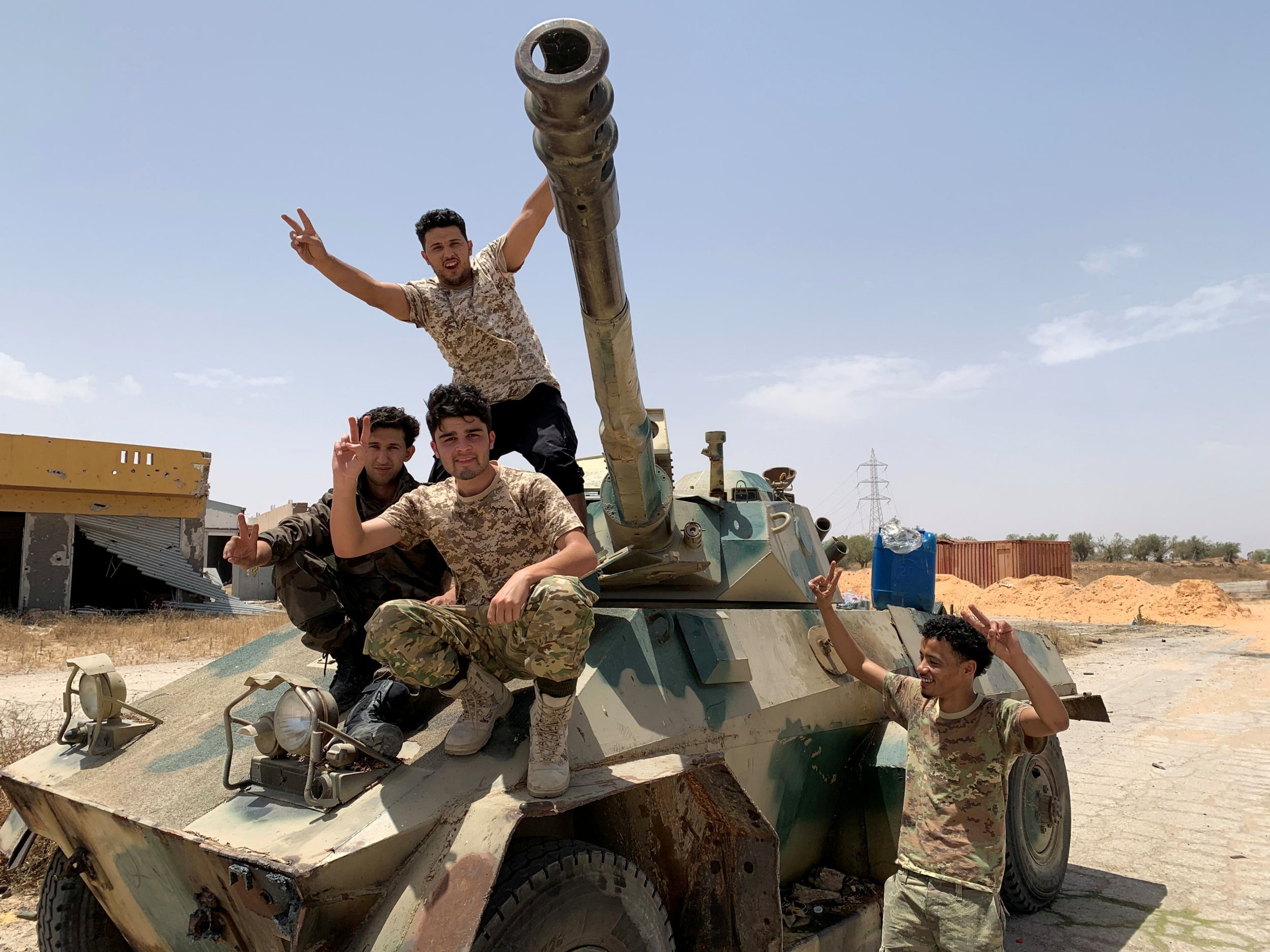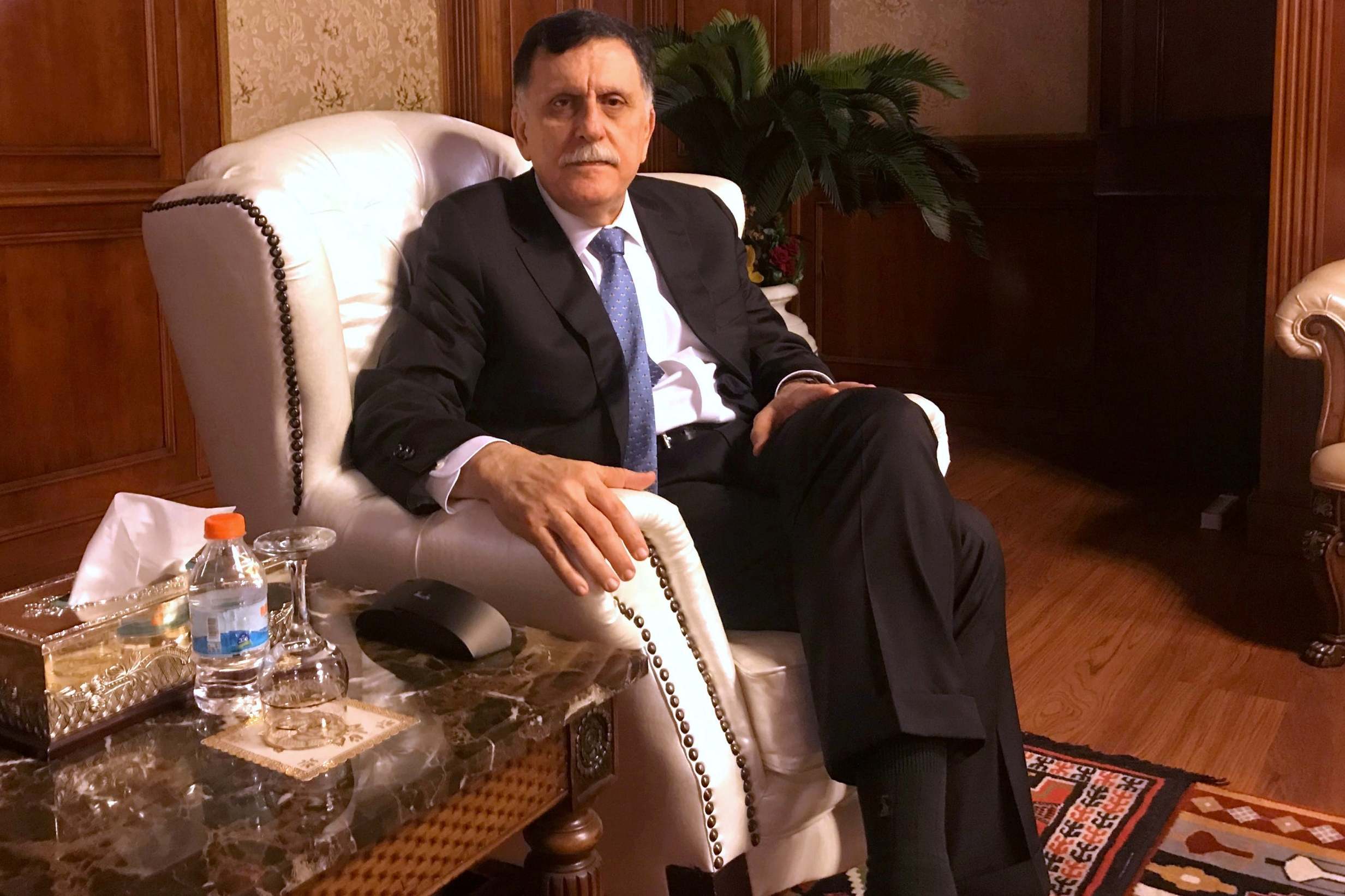Danger of ‘miscalculation’ as global powers scramble for position in Libya
Fighting moves from west to centre and south of country, as Egypt advances towards border, and Tripoli ignores truce calls

Your support helps us to tell the story
From reproductive rights to climate change to Big Tech, The Independent is on the ground when the story is developing. Whether it's investigating the financials of Elon Musk's pro-Trump PAC or producing our latest documentary, 'The A Word', which shines a light on the American women fighting for reproductive rights, we know how important it is to parse out the facts from the messaging.
At such a critical moment in US history, we need reporters on the ground. Your donation allows us to keep sending journalists to speak to both sides of the story.
The Independent is trusted by Americans across the entire political spectrum. And unlike many other quality news outlets, we choose not to lock Americans out of our reporting and analysis with paywalls. We believe quality journalism should be available to everyone, paid for by those who can afford it.
Your support makes all the difference.War-ravaged Libya begins a new phase of armed conflict after forces loyal to the internationally recognised government in Tripoli besieged strongholds of warlord Khalifa Haftar in the country’s centre and south.
At least 16,000 civilians were displaced in the recent weeks of fighting in which numerous military facilities, neighbourhoods and towns changed hands in western Libya, according to the United Nations.
Now the battle has moved to the coastal city of Sirte, the hometown of former leader Muammar Gaddafi, and the remote airbase in Jufrah, where Russians have quartered a dozen war jets as well as mercenaries of the Kremlin-linked Wagner Group.
The conflict in Libya pits forces loyal to the former CIA asset Haftar, who is backed by the United Arab Emirates, Egypt, Saudi Arabia, Russia, and France, against the internationally recognised Government of National Accord (GNA), which is backed by Turkey.
Libya has long been a colonial asset and a commercial partner of western Europe. But in a strategic blow to the west, the future of the oil-rich north African nation of six million people is being carved out by Turkey and Russia, the two powers that are now the most influential players in the country.
“We’re now in a situation in which both Moscow and Ankara feel there is a renewed opportunity for them to play a more important diplomatic role,” said Virginie Collombier, a Libya specialist at the European University Institute of Florence.
Events throughout Libya in recent days have moved quickly, with fighters in gun-mounted vehicles on the move along dirt roads and highways, and officials inside the country and diplomats in world capitals scrambling to maintain their influence after the seismic collapse of Mr Haftar’s 14-month campaign to take over western Libya.
On Saturday, a sullen Mr Haftar appeared alongside his patron Egyptian president Abdel Fattah el-Sisi and a rival, Aguila Saleh, head of the long-sidelined parliament in eastern Libya, in a bid to propose a truce. The proposal, which calls on all forces in Libya to hand their weapons to Mr Haftar, has won the support of Arab nations and western powers but has been ignored or mocked by the GNA and Turkey.

Video posted online showed GNA forces pummelling Sirte, and approaching Jufrah, where Mr Haftar’s forces were seen to be retreating.
On Sunday, footage showed Egyptian M1A2 Abrams tanks and Mi-24VM attack helicopters approaching the Libyan border, stoking fears that Cairo would intervene in the conflict on behalf of Mr Haftar.
In a sign of friction and miscommunication within camps, the GNA has launched a trial against alleged Russian nationals Maxim Shugaley and Samir Seifan, captured last year and accused of being spies employed by the Wagner Group, just as GNA prime minister Fayez al-Sarraj was set to meet Moscow officials.
The meeting was abruptly called off amid accusations of overreach by GNA forces in both Sirte and Jufrah, both areas where shadowy Russian-employed forces remain.
“There seems to have been disagreement from late Friday onward between Turkey and the GNA and Russia about whether they should go to Jufrah,” said Tarek Megerisi, a Libya specialist at the European Council on Foreign Relations. “The Russians made that a red line, and communicated that to Turkey.”
Analysts say Moscow is playing a delicate balancing act, attempting to maintain flowering ties with Turkey in hopes of weakening Nato while appeasing pro-Haftar Arab autocracies that purchase its weapons.
“Eastern Libya should not be overrun and Turkey will not be able to secure a complete military victory, just as Russia and Assad could not take over all of Idlib,” said Vladimir Frolov, a former Russian diplomat. “Russia needs to support Egypt and the Emiratis in order that they do not suffer a major loss of face.”
Analysts worry that while all the various belligerents in the conflict insist they want peace, their moves on the ground appear inflammatory.
“There’s momentum where the Haftar backers say they want peace talks and then propose terms difficult for the other side to accept,” said Claudia Gazzini, an analyst at the Crisis Group, a conflict resolution advocacy organisation. “There appears to be a deal between Russia and Turkey – facts on the ground contradict that. There appears to be a rationale for talks between Libyan political and military actors, but they all have a pattern of miscalculation.”

Meanwhile, the GNA turned on the southern Sharara oil wells turned off by Mr Haftar in his bid to economically strangle Libya into submission.
Mr Haftar’s forces collapsed after Russians pulled their support from him in what some suspect was part of a deal inspired by Kremlin disappointment in the warlord’s abilities to deliver.
“It was clear that the situation on the ground changed once the Russian mercenaries withdrew,” said Ms Collombier. “It completely changed the picture of the conflict, and resulted in Haftar’s forces demonstrating they were completely unable to resist without Russian support.”
But Russian strategists insisted that Libya has never been a core interest for Moscow, and Mr Haftar has always been a disposable ally. “It’s clear that Haftar would not win militarily, and may well lose what he already has,” said Fyodor Lukyanov, an international affairs expert considered close to the Russian policy elite. “Libya was never for Russia what Syria is. Russia has very different stakes. Officially, Russia isn’t involved in Libya.”
Mr Lukyanov insisted that the west overstates Russia’s influence in Libya, and that Egypt and the Gulf states also will shape the outcome. “The final conditions will only be clear once people understand that there is no sense in fighting on,” he said. “This hasn’t happened yet.”
Join our commenting forum
Join thought-provoking conversations, follow other Independent readers and see their replies
0Comments